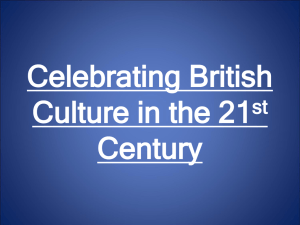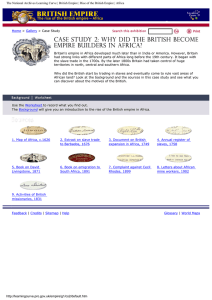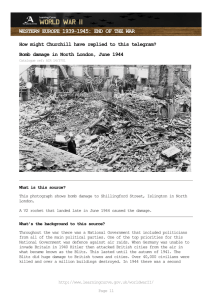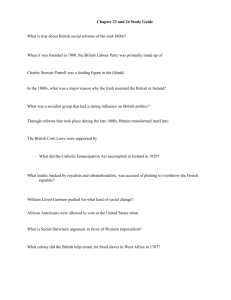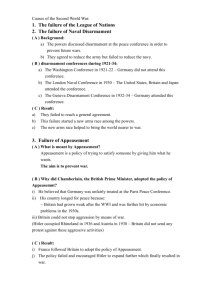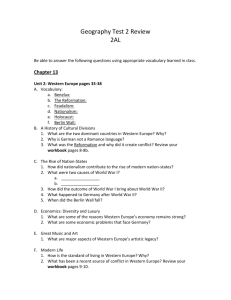Week 11: The People’s War Introduction
advertisement
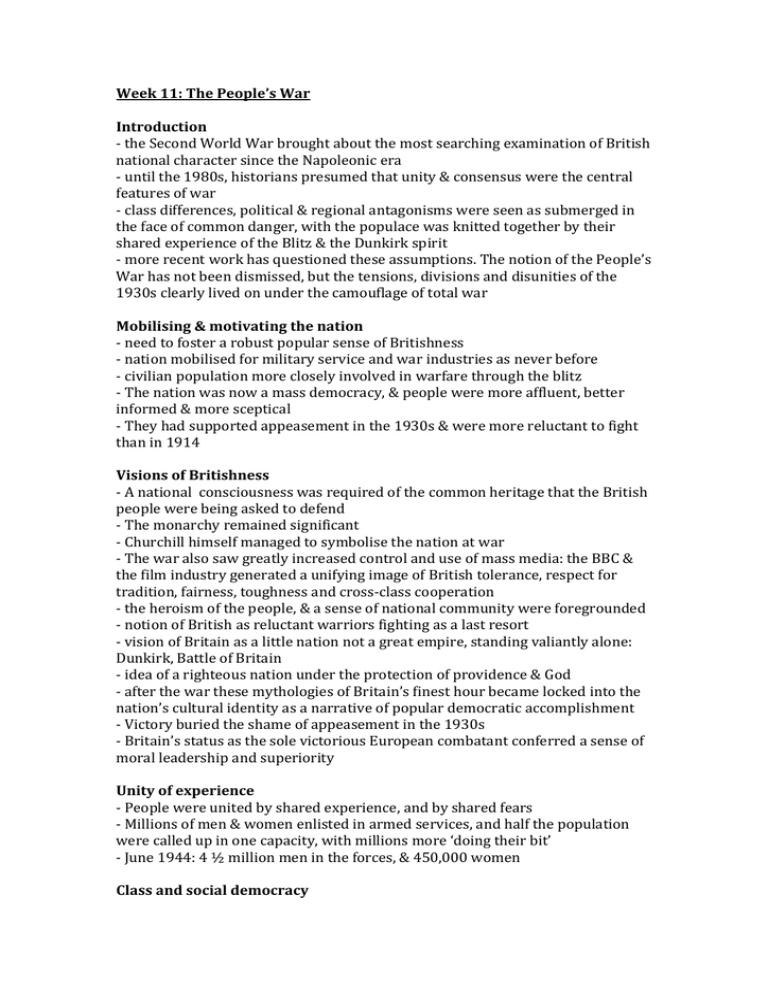
Week 11: The People’s War Introduction - the Second World War brought about the most searching examination of British national character since the Napoleonic era - until the 1980s, historians presumed that unity & consensus were the central features of war - class differences, political & regional antagonisms were seen as submerged in the face of common danger, with the populace was knitted together by their shared experience of the Blitz & the Dunkirk spirit - more recent work has questioned these assumptions. The notion of the People’s War has not been dismissed, but the tensions, divisions and disunities of the 1930s clearly lived on under the camouflage of total war Mobilising & motivating the nation - need to foster a robust popular sense of Britishness - nation mobilised for military service and war industries as never before - civilian population more closely involved in warfare through the blitz - The nation was now a mass democracy, & people were more affluent, better informed & more sceptical - They had supported appeasement in the 1930s & were more reluctant to fight than in 1914 Visions of Britishness - A national consciousness was required of the common heritage that the British people were being asked to defend - The monarchy remained significant - Churchill himself managed to symbolise the nation at war - The war also saw greatly increased control and use of mass media: the BBC & the film industry generated a unifying image of British tolerance, respect for tradition, fairness, toughness and cross-class cooperation - the heroism of the people, & a sense of national community were foregrounded - notion of British as reluctant warriors fighting as a last resort - vision of Britain as a little nation not a great empire, standing valiantly alone: Dunkirk, Battle of Britain - idea of a righteous nation under the protection of providence & God - after the war these mythologies of Britain’s finest hour became locked into the nation’s cultural identity as a narrative of popular democratic accomplishment - Victory buried the shame of appeasement in the 1930s - Britain’s status as the sole victorious European combatant conferred a sense of moral leadership and superiority Unity of experience - People were united by shared experience, and by shared fears - Millions of men & women enlisted in armed services, and half the population were called up in one capacity, with millions more ‘doing their bit’ - June 1944: 4 ½ million men in the forces, & 450,000 women Class and social democracy - ideas of equality and fairness central to war propaganda - class barriers were eroded by rationing, full employment, rent controls etc - 1942 Beveridge Report proposing universal unemployment benefits without means test, children’s allowances, national health service - 1944 Butler Education Act introduced free secondary education for all Unity of the UK - demands of wartime industry meant that the declining heartlands of heavy industry in Scotland & Wales were revived overnight, blunting nationalist discontent in the process - growing English realization that loyalty of Scots & Welsh could not be taken for granted - the Nazis threatened England, Wales & Scotland alike Unity of empire - without the Indian army (2.5 million recruits by 1945) Britain could not have fought in the Middle or Far East - Troops from Australia, South Africa, East and West Africa, the West Indies and Burma all made immense contributions Political unity - effective coalition government under Churchill - apparent burying of political in-fighting and ideological difference in the interests of a unified war effort Female experience of war - women mobilised on a greater scale than in WW1 - subject to conscription under the 2nd National Service Act of 1941 - by 1943, 7.25 million women employed in war effort - Greater employment of women than in Germany, Russia or US - for many, a glimpse of a more independent & fulfilling life - increased public recognition of female courage, stoicism & endurance Nonetheless, the reality of Britishness during the war was much more fractured and complex than this suggests Class - war frequently intensified class hatreds - myth of the communal Blitz spirit disguised the reality that public air raid shelters were used chiefly by the working classes - evacuation of 826,000 largely working-class children to middle-class homes in the country brought further opportunities for class conflict - class continued to influence access to food & clothing: restaurants & black market open to the wealthy UK - English still saw the minority nations as loyal but subsidiary to the war effort; & Scottish & Welsh characters in film tended to be marginal - anti-Irish sentiments widespread Empire - empire figured surprisingly little in projections of Britishness - touchstones for national unity generally closer to hand & more insular: the white cliffs of Dover, the Spanish Armada, Francis Drake & Nelson - ideas of race and ethnicity continued to cut across the imperial family: belief in the superiority of the white British nation - the ‘Finest Hours’ of the war conceptualised as white - sacrifices made by non-white combatants all too easily forgotten Women & war - female munitions workers paid less than men - women in forces were restricted to non-combatant roles - female civil defence workers were given 2/3 of male pay & received 2/3 of their compensation if injured - more relaxed sexual morality of the war years, and a rise in divorce and unmarried pregnancy, widely attributed to female immorality - Women up to 23 years of age could still be sent to borstal for perceived promiscuity and sexual non-conformity. Regulation 33B allowed authorities to compel persons to undergo examination for VD if named by 2 others as source of infection. 1944: 417 forced to comply of which 414 were female - remained the case throughout the war that Britishness was defined more in terms of masculinity than femininity Political & ideological divisions - intense ideological conflict between left & right marked the final years of the war, with concerted Tory opposition to the growth of welfarism and state control in favour of the free market - Labour politicians also used the war to reposition their party as patriotic and British, rather than Soviet or continental - Conservative failures in the 1930s re. the Depression and appeasement were turned by Lab into foundation of their own credentials to represent the nation - Labour held out the vision of a better Britain while also managing to clothe this in ideas of continuity and tradition Industrial action - strikes banned in 1940, but unofficial disputes & walkouts cost Britain millions of man days of work (this was not reported by the BBC for the first 4 yrs of war) - in 1944, the number of days lost due to industrial action was treble that in 1938 Criminality - crime rose steeply during the war (looting and black market activity) - after Dunkirk looting in London went from 539 to 1662 cases per month - the number of juveniles found guilty of indictable offences increased by 42% between 1939 & 1942 Family The strains and dislocations of war also meant that family, marriage & parenting were all profoundly challenged and disrupted
